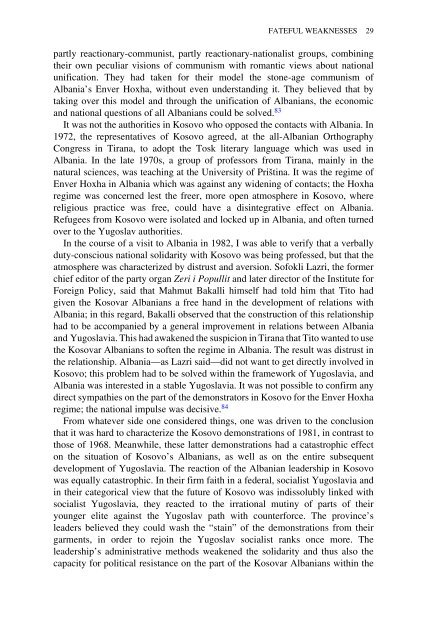Yugoslavia: A History of its Demise - Indymedia
Yugoslavia: A History of its Demise - Indymedia
Yugoslavia: A History of its Demise - Indymedia
Create successful ePaper yourself
Turn your PDF publications into a flip-book with our unique Google optimized e-Paper software.
FATEFUL WEAKNESSES 29<br />
partly reactionary-communist, partly reactionary-nationalist groups, combining<br />
their own peculiar visions <strong>of</strong> communism with romantic views about national<br />
unification. They had taken for their model the stone-age communism <strong>of</strong><br />
Albania’s Enver Hoxha, without even understanding it. They believed that by<br />
taking over this model and through the unification <strong>of</strong> Albanians, the economic<br />
and national questions <strong>of</strong> all Albanians could be solved. 83<br />
It was not the authorities in Kosovo who opposed the contacts with Albania. In<br />
1972, the representatives <strong>of</strong> Kosovo agreed, at the all-Albanian Orthography<br />
Congress in Tirana, to adopt the Tosk literary language which was used in<br />
Albania. In the late 1970s, a group <strong>of</strong> pr<strong>of</strong>essors from Tirana, mainly in the<br />
natural sciences, was teaching at the University <strong>of</strong> Priština. It was the regime <strong>of</strong><br />
Enver Hoxha in Albania which was against any widening <strong>of</strong> contacts; the Hoxha<br />
regime was concerned lest the freer, more open atmosphere in Kosovo, where<br />
religious practice was free, could have a disintegrative effect on Albania.<br />
Refugees from Kosovo were isolated and locked up in Albania, and <strong>of</strong>ten turned<br />
over to the Yugoslav authorities.<br />
In the course <strong>of</strong> a visit to Albania in 1982, I was able to verify that a verbally<br />
duty-conscious national solidarity with Kosovo was being pr<strong>of</strong>essed, but that the<br />
atmosphere was characterized by distrust and aversion. S<strong>of</strong>okli Lazri, the former<br />
chief editor <strong>of</strong> the party organ Zeri i Popullit and later director <strong>of</strong> the Institute for<br />
Foreign Policy, said that Mahmut Bakalli himself had told him that Tito had<br />
given the Kosovar Albanians a free hand in the development <strong>of</strong> relations with<br />
Albania; in this regard, Bakalli observed that the construction <strong>of</strong> this relationship<br />
had to be accompanied by a general improvement in relations between Albania<br />
and <strong>Yugoslavia</strong>. This had awakened the suspicion in Tirana that Tito wanted to use<br />
the Kosovar Albanians to s<strong>of</strong>ten the regime in Albania. The result was distrust in<br />
the relationship. Albania—as Lazri said—did not want to get directly involved in<br />
Kosovo; this problem had to be solved within the framework <strong>of</strong> <strong>Yugoslavia</strong>, and<br />
Albania was interested in a stable <strong>Yugoslavia</strong>. It was not possible to confirm any<br />
direct sympathies on the part <strong>of</strong> the demonstrators in Kosovo for the Enver Hoxha<br />
regime; the national impulse was decisive. 84<br />
From whatever side one considered things, one was driven to the conclusion<br />
that it was hard to characterize the Kosovo demonstrations <strong>of</strong> 1981, in contrast to<br />
those <strong>of</strong> 1968. Meanwhile, these latter demonstrations had a catastrophic effect<br />
on the situation <strong>of</strong> Kosovo’s Albanians, as well as on the entire subsequent<br />
development <strong>of</strong> <strong>Yugoslavia</strong>. The reaction <strong>of</strong> the Albanian leadership in Kosovo<br />
was equally catastrophic. In their firm faith in a federal, socialist <strong>Yugoslavia</strong> and<br />
in their categorical view that the future <strong>of</strong> Kosovo was indissolubly linked with<br />
socialist <strong>Yugoslavia</strong>, they reacted to the irrational mutiny <strong>of</strong> parts <strong>of</strong> their<br />
younger elite against the Yugoslav path with counterforce. The province’s<br />
leaders believed they could wash the “stain” <strong>of</strong> the demonstrations from their<br />
garments, in order to rejoin the Yugoslav socialist ranks once more. The<br />
leadership’s administrative methods weakened the solidarity and thus also the<br />
capacity for political resistance on the part <strong>of</strong> the Kosovar Albanians within the
















